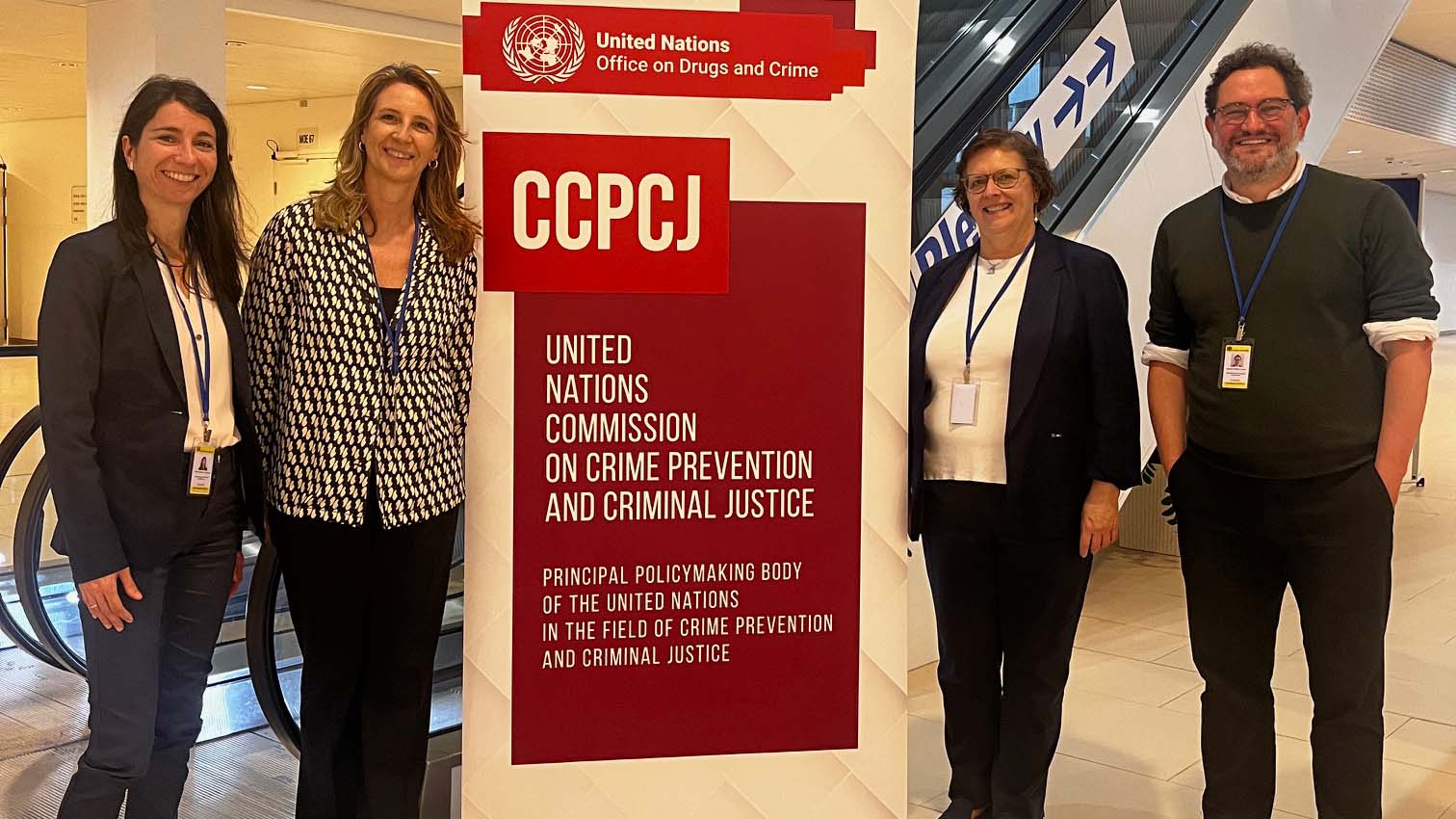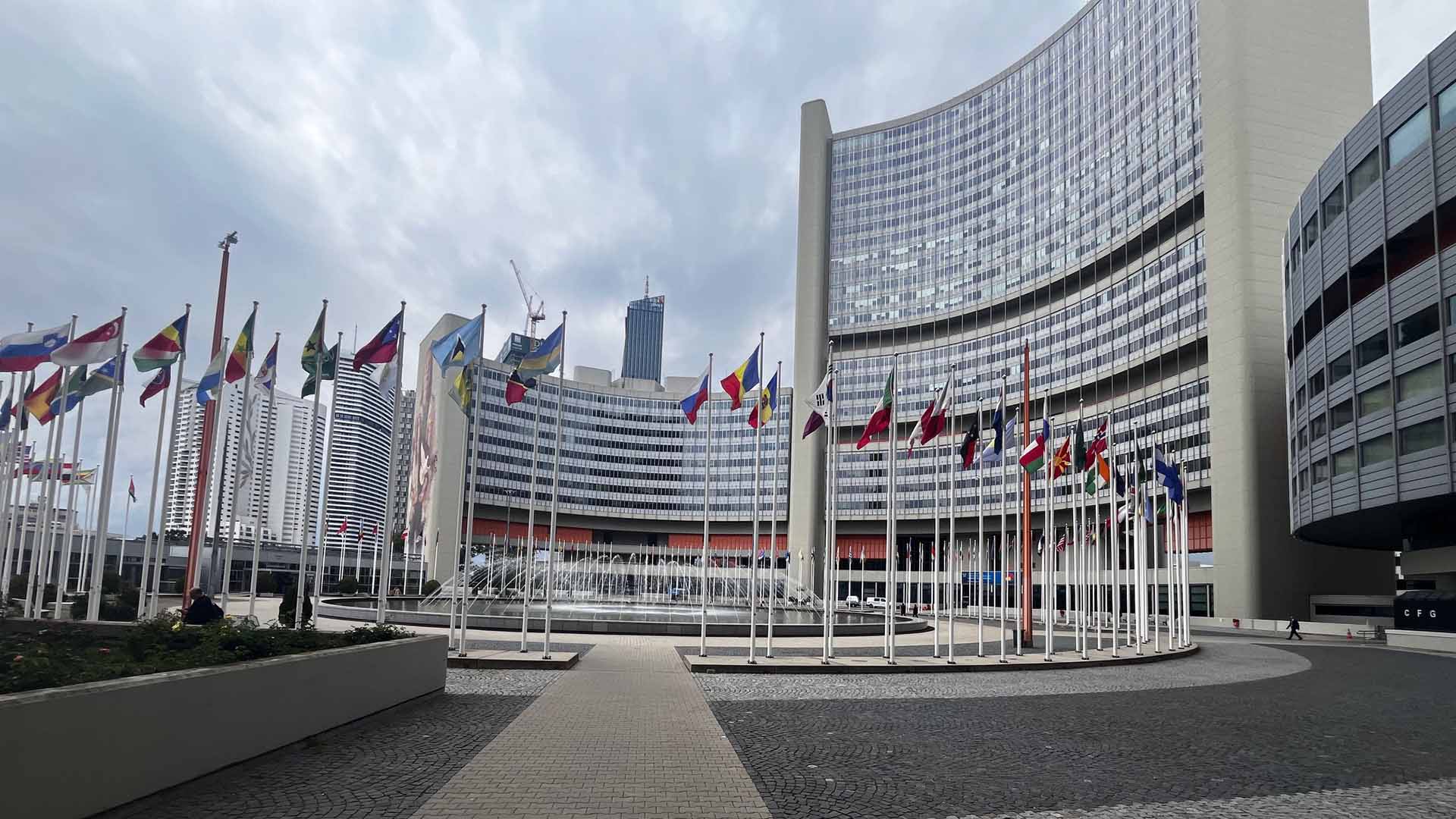Dr Camilo Gomez discusses cyber crime 'wake-up call' at UN commission in Vienna

In the photo above are: Dr Meritxell Pérez Ramírez (President of the Spanish Criminological Association), Professor Andrea Giménez-Salinas (President of the Crime and Security Research Foundation in Spain), Professor Rosemary Barberet, (International Sociological Association Representative to the United Nations), Dr Camilo Tamayo Gomez
What do AI-generated deepfakes, extremist groups in virtual reality, and election disinformation campaigns in the Global South have in common?
According to Senior Lecturer in Criminology Dr Camilo Tamayo Gomez, they are all part of a growing phenomenon he calls the 'crimes of the future'. He recently had the opportunity to present his work on this urgent issue on the world stage at the 34th Session of the United Nations Commission on Crime Prevention and Criminal Justice (CCPCJ), held in Vienna, Austria.
Representing the University of Huddersfield’s Crime and Policing Research Centre, Dr Tamayo Gomez was invited to speak at a high-profile side event organised by the International Sociological Association, alongside partners including Criminologists Without Borders, the World Society of Victimology, and the American Society of Criminology.
His talk formed part of a broader session titled New, Emerging and Evolving Forms of Crime, exploring how rapidly evolving digital technologies are transforming the nature of criminal activities worldwide.
From extremist gaming to deepfake blackmail
Drawing on recent case studies and policy work, Dr Tamayo Gomez laid out what he sees as four key trends in emerging forms of digital criminality.
The first is the use of generative artificial intelligence by extremist groups. These groups are using AI to produce tailored propaganda, deepfake videos, forged documents, and even synthetic voices that are harder than ever to detect and incredibly persuasive.
“This is not just about misinformation,” he explains. “It’s about manipulating emotional and psychological responses at scale, in ways we’re only beginning to understand”.
The second trend is the creation of extremist communities in the metaverse. Some groups are now building virtual training grounds that simulate real-world conflict scenarios, spaces that can be used to teach insurgent tactics, spread ideology, and coordinate offline actions. These virtual environments, often gamified and encrypted, pose major challenges for monitoring and intervention.

There is also the increasingly common use of automated disinformation campaigns aimed at disrupting democratic processes in the Global South. With little oversight and plenty of linguistic and legal loopholes, AI-powered bots are flooding digital platforms with false narratives that can erode trust in elections and incite unrest.
Finally, Dr Tamayo Gomez highlighted the rise of deepfake-fuelled extortion. Violent groups are creating fake compromising material, photos, videos, or messages to blackmail journalists, human rights defenders, and public officials. In parallel, ransomware attacks continue to target critical institutions, often using AI to exploit vulnerabilities in digital infrastructure.
“These are not crimes of science fiction”, he says. “They’re happening now, and they’re likely to become more common as digital technologies outpace our ability to regulate them”.
A global collaboration
In addition to his UN presentation, Dr Tamayo Gomez also contributed to a recent report published by the United Nations Interregional Crime and Justice Research Institute (UNICRI). Titled Right- and Left-Wing Violent Extremist Abuse of Digital Technologies in South America, Africa and Asia, the report explores how fringe movements across the Global South are using encrypted messaging apps, decentralised platforms, and gaming environments to spread ideologies and organise activities.
The report includes detailed studies from Brazil, South Africa, India and Southeast Asia. It points to serious gaps in regulation, content moderation, and language coverage, factors that give extremist actors more room to operate than in Europe or North America.
“This report is a wake-up call,” says Dr Tamayo Gomez. “It shows that technological inequality and governance gaps are making some regions far more vulnerable than others.”
Why It Matters
Dr Tamayo Gomez’s work sits at the intersection of sociology, criminology, digital sociology, and international justice, fields that are increasingly converging as global threats evolve. He believes universities have a key role to play in informing public policy and shaping global responses to these challenges.
“Whether it’s AI-driven propaganda or cyber-extortion, we’re dealing with forms of harm that cross borders, evade detection, and exploit digital systems in ways we haven’t seen before,” he says. “That’s why it’s so important that research communities stay ahead of the curve.”
The University of Huddersfield, through his work, is helping to do just that, contributing to UN initiatives, shaping global discussions, and helping to ensure that tomorrow’s digital frontiers don’t become tomorrow’s battlegrounds.